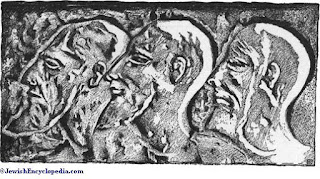"Preparation for Death: Considerations on Eternal Truths"
by St. Alphonsus Liguori
Consideration XVIII: The Number of Sins
“Because sentence is not speedily pronounced against evil,
the children of men commit evil without fear.” – Eccles. 8:11
FIRST POINT
The Measure is Determined for Each One
IF God instantly chastises the man who insults him, we
certainly should not see him so much outrages as we do at present. But because the Lord does not instantly
punish sinners, but waits for them, they are encouraged to offend him the
more. It is necessary to understand
that, though God waits and bears, he does not wait and bear forever.
It is the opinion of many holy Fathers – of St.
Basil, St. Jerome, St. Ambrose, St. Cyril of Alexandria, St. John Chrysostom,
St. Augustine, and others – that as God, according to the words of Scripture,
Wis. 11:21,
Thou hast ordered all things in measure,
and number and weight has
fixed for each
the number of his days, the degrees of health and talent
which
he will give to him,
so he has also determined the number of sins
that he will
pardon;
and when this number is completed,
he will pardon no more.
Eusebius of Caesarea says the same thing: “God
waits up to a certain number, and afterwards abandons;” and so speak also the
above-mentioned Fathers.
And these Fathers have not spoken at random, but according to
the sacred Scriptures. In one place the
Lord says that he restrained his vengeance against the Amorrithes, because the
number of their sins was not as yet filled up:
For as yet the iniquities of the Amorrithes (Amorites*) are not at the full (Gen
15:16). In another place he says: I will
not add any more to have mercy on the house of Israel (Os. I,6). Again he says: All the men who have tempted
Me ten times shall not see the land (Num. 15:22). Thou hast, says Job, sealed up my offences as
it were in a bag (Job 14:16).
Sinners keep no account of their sins; but God keeps an account of them, that when the harvest is ripe, that is, when the number of sins is completed, he may take vengeance on them. Put ye in the sickles; for the harvest is ripe (Joel 3:13).
In another place he says: Be not without fear about sin forgiven, and
add not sin to sin (Sirach 5:5**). As if
he said: O sinner! You must tremble even on account of the sins which I have
forgiven you; for it you add another, if may happen that this new sin, along
with those which have been pardoned, may complete the number, then there will
be no more mercy for you. The Lord
waiteth patiently, that when the day of judgment shall come, he may punish them
in the fullness of their sins (2 Mac. 6:14).
God waits till the measure of iniquities is filled up, and then he
chastises the sinner.
Sinners keep no account of their sins; but God keeps an account of them, that when the harvest is ripe, that is, when the number of sins is completed, he may take vengeance on them. Put ye in the sickles; for the harvest is ripe (Joel 3:13).
 |
| handwriting on the wall—Mene, Thecel, Phares |
Of such chastisements there are many examples in the Scriptures. Saul disobeyed God a second time, and was
abandoned. When he entreated Samuel to
intercede for him, saying: Bear, I beseech thee, my sin, and return with me that
I may adore the Lord, Samuel answered: I
will not return with thee, because thou hast rejected the word of the Lord, and
the Lord hath rejected thee (1 Kings15:25).
We have also the example of Balthasar, who, after having profaned the vessels of the temple at table, saw a handwriting on the wall—Mene, Thecel, Phares. Daniel came, and in explaining the words, among other things, said: Thou art weighed in the balance, and art found wanting (Dan. 5:27). By these words he gave the king to understand that in the balance of divine justice the weight of his sins had made the scale descend. The same night Balthasar, the Chaldean king, was killed.
There are some who spend their time in investigating the number of the stars, the number of the angels, or the number of years which each one will live.
My brother, it may be that God will pardon you no more after the first criminal pleasure which you indulge, after the first thought to which you consent, or after the first sin which you commit.
We have also the example of Balthasar, who, after having profaned the vessels of the temple at table, saw a handwriting on the wall—Mene, Thecel, Phares. Daniel came, and in explaining the words, among other things, said: Thou art weighed in the balance, and art found wanting (Dan. 5:27). By these words he gave the king to understand that in the balance of divine justice the weight of his sins had made the scale descend. The same night Balthasar, the Chaldean king, was killed.
Oh ! how many
miserable sinners meet with a similar fate!
They live many years, multiplying sins;
but when the number is filled
up,
they are struck dead, and cast into hell!
They spend their days in wealth, and in a moment they go down to hell
(Job 21:13).
There are some who spend their time in investigating the number of the stars, the number of the angels, or the number of years which each one will live.
But who can discover the number of sins
which
God will pardon each individual?
We
should, therefore, tremble.
My brother, it may be that God will pardon you no more after the first criminal pleasure which you indulge, after the first thought to which you consent, or after the first sin which you commit.
Behold me, O my God! at
Thy feet. I am that disgusting dog that
has so often eaten the forbidden apples, which I before detested. I do not deserve mercy: but, O My Redeemer! The Blood which Thou shed for me encourages
me and obliges me to hope for it.
How
often have I offended Thee and Thou hast pardoned me! I promised never more to offend Thee, and I
have afterward returned to the vomit: (Prov 26:11) and Thou has again pardoned
me! What do I wait for? Is it that Thou
mayest send me to hell, or that Thou mayest abandon me into the hand of my
sins, which would be a greater punishment than hell?
No, my God!
I wish to amend: and in order to be faithful to Thee, I will put all my confidence
in Thee, I will, whenever tempted, always and instantly have recourse to
Thee.
Hitherto I have trusted in my
promises and resolutions, and have neglected to recommend myself to Thee in my
temptations: this has been the cause of my ruin. Henceforth Thou shalt be my hope and my strength,
and thus I shall be able to do all things.
I can do all things in Him that strengthened me. (Phil
4:13). Give me grace then, O my Jesus,
through Thy merits, to recommend myself to Thee, and to ask Thy aid in my
wants. I love Thee, O Sovereign Good,
amiable above every good. I wish to love
Thee alone; but it is from Thee I must receive aid to love Thee.
O Mary, my Mother! Do thou also assist me by
thy intercession; keep me under thy protection, and make me always invoke thee
when I am tempted. Thy name shall be my
defence.
. . . the isolated
remnants of the Amorites, who in pre-Philistine and pre-Israelitish times had
occupied a large part of the country west of the Jordan.
Amorites.(From the pylon
of the Ramesseum.)
In Tosef., Shab. (vii.
[viii.] 23), and generally in post-Biblical literature, the Canaanites are
usually spoken of as the Amorites (compare Assumptio Mosis, xi. 16; B. M. 25b);
and they were characterized by R. Jose, the chronicler, as the most intractable
of all nations. To the apocryphal writers of the first and second pre-Christian
century they are the main representatives of heathen superstition, loathed as
idolaters, in whose ordinances Israelites may not walk (Lev. xviii. 3).
A special section of the
Talmud (Tosef., Shab. vi.-vii. [vii.-viii.]; Bab. Shab. 67a et seq.) is devoted
to the various superstitions called "The Ways of the Amorites."
According to the Book of Jubilees (xxix. [9] 11), "the former terrible
giants, the Rephaim, gave way to the Amorites, an evil and sinful people whose
wickedness surpasses that of any other, and whose life will be cut short on
earth." In the Syriac Apocalypse of Baruch (lx.) they are symbolized by
"black water" on account of "their black art, their witchcraft
and impure mysteries, by which they contaminated Israel in the time of the
Judges."
**Sirach 5:5-7 Sirach 5:5-7Douay-Rheims 1899 American Edition (DRA)
5 Be not without fear about sin forgiven, and add not sin upon sin:
6 And say not: The mercy of the Lord is great, he will have mercy on
the multitude of my sins.
7 For mercy and wrath quickly come from him, and his wrath looketh upon
sinners.




No comments:
Post a Comment